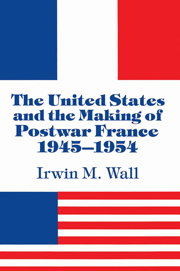Book contents
- Frontmatter
- Contents
- Acknowledgments
- List of abbreviations
- Introduction
- 1 The diplomatic heritage
- 2 The postwar years: Independence compromised
- 3 L'année terrible
- 4 Americanizing the French
- 5 Building an alliance
- 6 The Marshall Plan
- 7 Military aid and French independence
- 8 The United States and French Indochina
- 9 France declares its independence
- Conclusion
- Bibliography
- Index
8 - The United States and French Indochina
Published online by Cambridge University Press: 04 December 2009
- Frontmatter
- Contents
- Acknowledgments
- List of abbreviations
- Introduction
- 1 The diplomatic heritage
- 2 The postwar years: Independence compromised
- 3 L'année terrible
- 4 Americanizing the French
- 5 Building an alliance
- 6 The Marshall Plan
- 7 Military aid and French independence
- 8 The United States and French Indochina
- 9 France declares its independence
- Conclusion
- Bibliography
- Index
Summary
THE ORIGINS OF AMERICAN INTERVENTION
The Indochina drama became the central concern of American–French relations in the 1950s, virtually dominating every other issue in bilateral relations by 1953–4. It was also the issue over which Paris finally declared its independence of Washington in 1954, under the government of Pierre Mendés France. Among other questions only the European Defense Community could again cause the two nations so much mutual recrimination, bitterness, and grief, and its fate was tied to the Indochina War as well. It was perhaps appropriate that Indochina, rather than the EDC, should have been the main bone of contention between the two countries. For while the latter is now a minor footnote to history, Vietnam emerged as the central problem of American life in the 1960s and 1970s.
There were three periods in the evolution of American policy toward Indochina: 1945–9, during which the Americans remained anticolonial; 1950–2, when anticommunism and the Korean War led to deeper involvement in Indochina alongside the French; and 1953–4, when the new Republican administration in Washington seized direction of the war. From 1945 to 1949 American policy was the most liberal, but also the least effective in terms of exercising real influence over Paris. American policymakers regarded the old colonial systems as moribund and slated to disappear.
- Type
- Chapter
- Information
- The United States and the Making of Postwar France, 1945–1954 , pp. 233 - 262Publisher: Cambridge University PressPrint publication year: 1991

